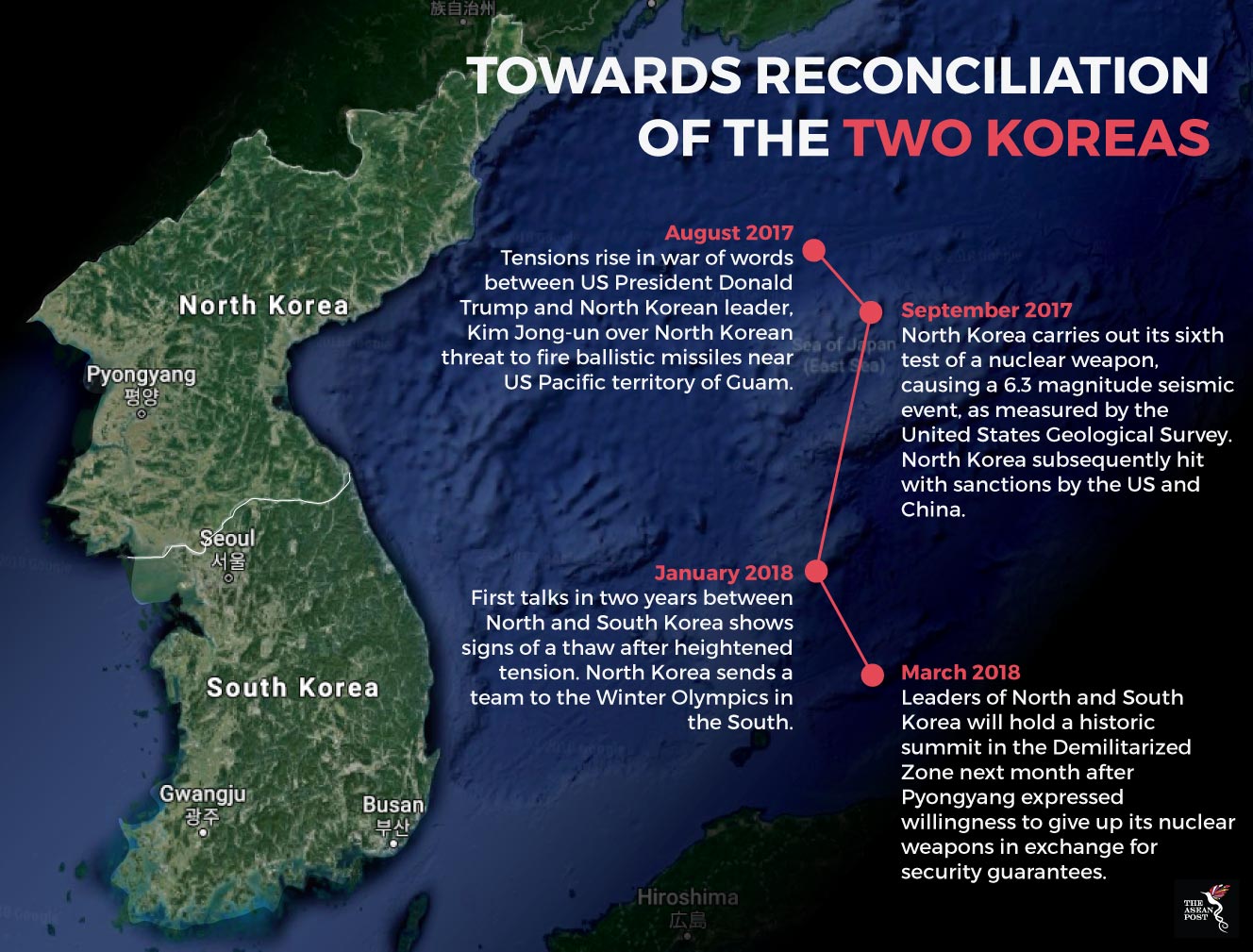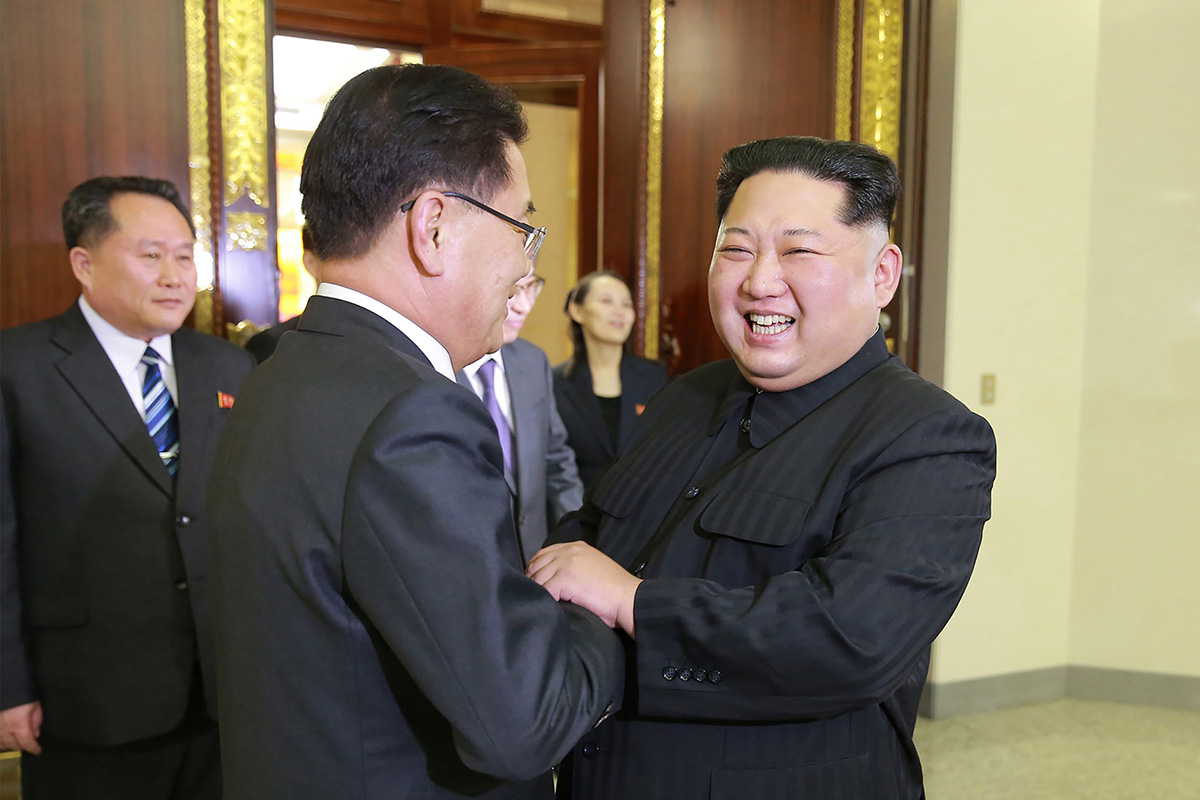Geopolitical developments in the Korean Peninsula have taken a turn for the better with North Korea agreeing to come to the meeting table with South Korea in April to deescalate prevailing nuclear tensions.
The meeting will mark the third time the leaders of the two Koreas are meeting – the previous two in 2000 and 2007 – but will be the first to take place in the Demilitarized Zone (DMZ). Pyongyang also promised that there will not be any nuclear or ballistic missile provocation whilst the dialogue was underway. Besides that, a hotline will be set up between the leaders of both Koreas.
According to South Korea's national security adviser Chung Eui-yong, Pyongyang “…made clear that there is no reason to own nuclear weapons if military threats toward the North are cleared and the safety of its regime is guaranteed.”
He also stated that the North “…expressed willingness to have frank dialogue with the US to discuss the denuclearisation issue and to normalize North Korea-US relations.”
Pyongyang’s actions were met with cautious optimism on all sides.
US President Donald Trump stated that he believed the North Koreans were “sincere” with their proposal, ascribing the latter’s change in demeanour to the array of sanctions imposed on North Korea’s economy over the past few months. Describing the developments as “positive”, Agence France Presse (AFP) reported that Trump refused to rule out a historic meeting with North Korean leader, Kim Jong Un.
“We are going to do something, one way or the other, we are going to do something and not let that situation fester,” Trump added.
China has also cautiously welcomed these talks and urged both, South and North Korea to “…seize the current opportunity” and reach a quick denuclearisation of the peninsula.
"We hope that all relevant parties can seize the current opportunity, work for the shared goal and make concerted efforts to promote the process of denuclearisation of the Peninsula and politically resolve the Korean Peninsula issue," said China’s foreign ministry spokesman, Geng Shuang.
“China is willing to continue to play its due role to this end,” added Shuang.

What to make of this olive branch?
Signs of thawing relations between North and South Korea were abound when Pyongyang agreed to send a team to the Winter Olympics in the South Korean city of Pyeongchang, last February.
Moreover, developments in the Korean Peninsula is highly likely to impact Southeast Asia which lies within the wider East Asian neighbourhood.
“Any spike in tensions in Northeast Asia, which houses some of the largest economies in the world, will be bad for Southeast Asia,” warned Harry Sa, Senior Analyst with the US Programme at the S. Rajaratnam School of International Studies (RSIS).
“Anything that disrupts economic growth, market stability, or international trade is harmful for the many Southeast Asian countries that need peaceful conditions for continued development,” he added.
However, a rule of thumb when dealing with diplomatic navigations vis-à-vis the Korean Peninsula is to always maintain caution even when a situation seems optimistic.
This isn’t the first time Pyongyang has extended an olive branch to their Southern counterparts to reduce tensions. The first such inter-Korea meeting was held in 2000 between Kim Jong Un’s father, Kim Jong Il and then South Korean President, Kim Dae Jung. The talks which occurred amid severe scrutiny from the international community resulted in an eight-point declaration which aimed to ease military tensions and establish permanent peace in the peninsula.
However, history can attest to the failures of that agreement.
Besides that, another lesson to learn from negotiations with Pyongyang is from the Six Party Talks. This failed dialogue was most notably a playground for North Korean diplomats to squeeze concessions from their US counterparts whilst continuing to develop their nuclear arsenal. If they didn’t get what they wanted, discussions often stonewalled which would result in a complete breakdown of communications between the negotiating parties.
Sa, who is an Korean Peninsula security expert welcomed Pyongyang’s proposal but generally, remained sceptical.
“We’ve all been here at this point before. North Korea is going to have to show a lot more before we can really start to believe denuclearisation and peace will come to the peninsula. This could easily just be an extravagant plan to further divide the US and South Korea. Until we see more, I’ll be holding onto that scepticism,” he said in an email reply to The ASEAN Post.
While future talks with North Korea should be carried out in an open minded manner, it would be wise for South Korea to remember its past experiences of negotiating with the Kim Dynasty.
Recommended stories:
